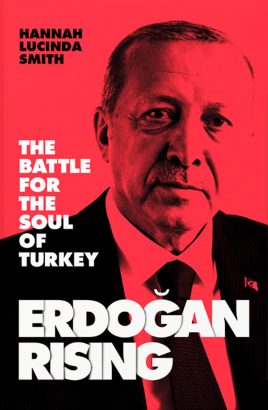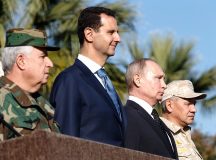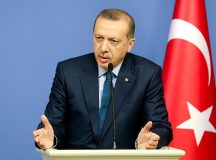When the US announced that it was pulling out of northeast Syria and Turkish forces began pouring in, the world reacted with horror. How could Donald Trump have betrayed the region’s Kurds and the YPG fighting force, their erstwhile allies in the ground war against ISIS? And how could Turkey not possibly understand that it was permitting a gruesome organisation, responsible for some of the deadliest terrorist attacks seen across the western world this decade, to rebuild itself?
A timely chapter in Hannah Lucinda Smith’s Erdoğan Rising gives a thorough grounding in the answer. It is the same explanation I have been giving to just about everyone who has asked me over the past fortnight about this latest conflict: for Turkey, public enemy number one is not ISIS, but the Kurdistan Workers’ Party (PKK), the outlawed militant group with which it has fought a protracted, deadly conflict for decades.
When ISIS launched its September 2014 offensive in Syria, the YPG looked like they could be the much-needed heroes the western world was looking for, Smith writes, but they were ‘a newish incarnation of a group that boasted a long relationship with Syria and the Assad family – the PKK’. Hers is a prescient observation: just last week, in response to the Turkish operation, Syria’s Kurds struck a hurried deal with Bashar al-Assad, allowing Syrian government forces to reoccupy swathes of northern territory it has not held since the early days of the civil war.
Smith, The Times’s Istanbul correspondent, began her foreign reporting career in Syria and some of the most evocative passages in this book are from that country, as she recounts her time alongside different sections of the rebellion against Assad. From early meetings with timid, headscarf-clad activists in Damascus, she eventually embedded herself alongside the Free Syrian Army in the country’s northwest, using the nearby Turkish town of Hatay as a base.
There are some vivid descriptions of the day-to-day practicalities of life on the border of ISIS territory, such as the family-run banking services used by refugees to send money home to relatives who stayed behind. The story of her fixer Soheib, who felt implausibly optimistic about ISIS, powerfully illustrates how some Syrians believed they could work around the new status quo in their country. In Soheib’s case, that optimism would prove fatally misplaced.
But, powerful though those chapters are, they do not fully square with the rest of the book. In fact, it is not immediately clear what kind of book Erdoğan Rising is. On first glance, it appears to be a biography charting Turkey’s towering leader, a man rivalled only by Atatürk for the degree to which he has transformed his country. That perception is reinforced by the book’s packaging: the cover picture is of a surly Erdoğan, and the president is name-checked seven times in the blurb alone.
But this is not a biography, at least not of the conventional cradle-to-grave variety. Smith has written a book that fuses the president’s story with that of her own career, peppered with snippets of Turkish history. The chapters set in Syria barely mention Turkey, let alone Erdoğan, creating a kaleidoscope of themes that occasionally makes the book’s sequencing a little awkward.
Turkey is a beautiful country and easy fall in love with, and Smith has clearly caught the bug: for her, like many others, it happened while watching the panoramic view glide past during a late-night minibus ride over Istanbul’s Bosphorus Bridge.
There are some captivating episodes from Smith’s travels around the country. She takes us to meet the humble descendants of Atatürk’s closest blood relatives, and the crowds who turn out each summer to watch an otherwise unremarkable mountain cast a shadow in the shape of Atatürk’s silhouette.
We visit grim concrete-clad Istanbul neighbourhoods like Çekmeköy, where the people gush about Erdoğan and his achievements because they did not have basic services like asphalted roads until a few years ago. Then there is her encounter in Kısıklı, on the city’s Asian side, when she was detained by police while asking locals close to Erdoğan’s luxury home what they thought of the man himself. Having had encounters of my own with Turkish law enforcement, it left me in a genuine sweat.
She taps adroitly into the reason why the Turkish president is a subject worth scrutinising in detail – how is it that a man described, lazily, as an absolutist dictator can only squeak through with wafer-thin electoral majorities?
Many have offered a simple, digestible explanation: Turkey is a country hopelessly divided on the one hand between elite secularists, who reigned supreme since Atatürk first separated mosque and state, and the poorer, ostracised pious folk on the other who finally found their voice in Erdoğan. The truth is that Turkey’s divisions are not binary, but the episodes in Erdoğan Rising could leave you thinking that they are. There is very little treatment of other voices in this complicated country, such as the Alevi minority or Turkey’s nationalists – the latter a complicated term that covers everything from religious patriots to racial purists. Some nationalists are now allied to Erdoğan; others cannot stand the sight of him.
Given the level of outside interest in Turkey and its neighbourhood, there are surprisingly few accessible books out there to explain the domestic issues that cause this country to convulse. Smith’s writing style helps place this book in that ill-populated category: warm and engaging, her enthusiasm for the country shines through, and it makes a good guide for anyone looking to understand how Erdoğan’s Turkey evolved.
But those already familiar with the broad strokes of Turkish affairs will be left hungry for more. The fact is that Erdoğan is no longer rising; after nearly 17 years at the top, he has risen, and mounting discontent and a shaky economy mean that his position is more precarious than ever.





































